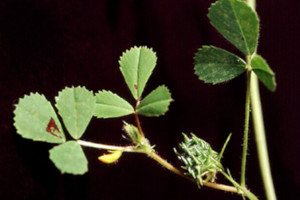Generalities
A fundamental property of Fabaceae, greatly responsible for their agronomic value, is their ability to fix nitrogen through symbiosis with Rhizobium (aerobic soil bacteria). This characteristic explains the high protein content of these plants, and allows this protein synthesis without the need for chemical nitrogen fertilization.
In recent years, many laboratories use Medicago truncatula (M. truncatula) to study various aspects of plant-microorganism interactions. Its genome is highly syngenic with the most cultivated legume species in Europe, such as pea or cultivated lucerne (M. sativa). M. truncatula is a diploid species, whose genome (seven times smaller than that of the pea) allows rapid access to genomic sequences and the production of mutants for functional genetic analysis. The development of research on this model organism will provide important tools for the genetics and improvement of cultivated legumes, whether for basic research or in the field of private research.
Reproduction
Reproduction period: all year round in greenhouses. Development cycle : about 12 weeks.
Pollination is autogamous: the flowers are bisexual or hermaphrodite (they have male and female organs in the same flower) and the maturity of the gametes is simultaneous.
Tools
- Collection of natural variants and induced mutants
- Tilling mutagenesis
- Insertional mutagenesis (more than 200,000 insertions in M. truncatula ssp. tricycla R108)
- Transgenesis (transformation by Agrobacterium tumefaciens and somatic embryogenesis)
- RNAi gene silencing
- Transcriptomic analyses
- EST, cDNA libraries
Databases
General databases:
http://www.noble.org/MedicagoHandbook/
Genomic databases:
http://mips.gsf.de/proj/plant/jsf/medi/download/index.jsp
http://www.tigr.org/tdb/e2k1/mta1/
Insertion mutant library:
https://medicago-mutant.noble.org/mutant/index.php
Tilling database:
Infrastructures
- UMR Diversité, Adaptation, Développement des plantes (DIADE) -
- http://diade.ird.fr/
- Montpellier
- URP3F - Unité de Recherche Pluridisciplinaire Prairies et Plantes Fourragères
- https://www6.nouvelle-aquitaine-poitiers.inrae.fr/urp3f
- Lusignan
- Laboratoire des Interactions Plantes Microorganismes (LIPM)
- https://www6.toulouse.inrae.fr/lipm
- Toulouse
- UMR Agronomie - INRAE/AgroParisTech/Université Paris-Saclay
- https://www6.versailles-grignon.inrae.fr/agronomie/
- Paris
Experts
- Pascal RATET
- Pascal.Ratet@isv.cnrs-gif.fr
- IPS2, Gif-sur-Yvette
